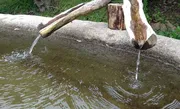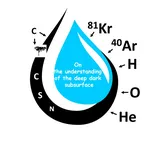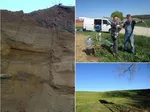TRACE-STA

Hydrogeology, Biogeochemistry and Modelling Group
Hydraulic Investigations in the Area of the New Construction Project "Starnberg Tunnel". The Chair of Hydrogeology has been commissioned to verify the groundwater flow directions resulting from numerical simulations through appropriate experimental investigations.
Targeted SDG: 11
Siro-N

Hydrogeology, Biogeochemistry and Modelling Group
On the origin of nitrate in a spring catchment area. Using stable isotope technique coupled with UV spectral sensors, tracer hydrogeology and modeling should help to identify nitrate sources, its origin and possible microbial conversion in the subsurface.
Targeted SDG: 6
Geothermal-DHC
Geothermal-DHC aims to address the integration of geothermal technologies to heating and cooling grids based on experiences from case studies across Europe. About 40 Institutions take part in this action. TUM is National Coordinator.
Energie Atlas Bayern
Bayernweite räumlich detaillierte Bestimmung des technisch nutzbaren Potenzials der oberflächennahen Geothermie zur Einbindung in den Energieatlas Bayern.
Funded by: LfU Bayern; StMWi Targeted SDG: 7; 11; 17
GeoSPOT - Augsburg

The research objective of the GeoSPOT project is the creation of a hydrogeological and geothermal database to estimate and improve the geothermal potential of the shallow quaternary aquifer in the wider area of Augsburg. Furthermore, the extension of the 3D-geological lithofaciesmodel of Munich (GeoPot-project) for user-specific applications is carried out.
ISOCHEM

Hydrogeology, Biogeochemistry and Modelling Group; Geothermal Energy Group
Geothermal heat is the heat source beneath our feet and geothermal power is generated by extracting that heat from the deep subsurface. To effectively use this energy, we must have a detailed understanding of the underlying geology and the groundwater flow system. Environmental isotopes and pore-water chemistry help us understand complex groundwater systems with karstic features, fractures and a porous rock-matrix.
Funded by: LfU Bayern; StMUV Targeted SDG: 6; 7; 11
GEOmaRe

Ziel des Projektes "GEOmatic und Reservoirengineering" ist es, ein bestehendes Erschließungskonzept in Richtung der Implementierung und Steuerung der SWM-Bestands- und Realisierungsprojekte und der damit einhergehenden Reservoirnutzung weiterzuentwickeln.
DEEPWATER-CE

Hydrogeology, Biogeochemistry and Modelling Group
The aim of this project is to investigate the feasibility of managed aquifer recharge (MAR) solutions for replenishing groundwater resources, which are endangered by climatic change and excessive pumping.
Cutting-edge research

Hydrogeology, Biogeochemistry and Modelling Group
Public water suppliers in Germany, Europe, and the US have problems with elevated nitrate concentrations in groundwater. Groundwater, however, represents an important drinking water resource, particularly in those regions that have no surface water.
Funded by: IGSSE - TUM, TUM Targeted SDG: 6
KLIP

In the framework of the KLIP project an update of the temperature distribution on the surface of the Malm aquifer is made in two pilot areas near Munich. Besides the temperature regionalization based on corrected “bottom-hole temperatures” (BHT), a sensitivity analysis for the different parameters used in the BHT correction methods is required to distinguish and quantify uncertainties due to the different correction techniques.
Funded by: LfU Bayern; StMUV Targeted SDG: 7; 11
GeoPot - Munich

The research objective of the GeoPot project is to edit hydrogeological and geothermal data, to create, for the first time, an area-wide database, especially for 3D modelling and the use of geo-potentials of the tertiary subsurface (OSM) in the wider area of Munich.
Funded by: LfU Bayern; StMUV Targeted SDG: 6; 7; 11
Geothermal Alliance Bavaria (GAB-1)

The Chair of Hydrogeology investigates the long-term hydraulic and thermal behavior of the Malm aquifer. For this purpose the Geothermal Alliance Bavaria analyses relevant data from the geothermal sites in the southern molasses basin and participates in borehole logging campaigns and well testing to elevate a set of “best-off” data for the research.
GEO.KW

The objective of GEO.KW is the development of tools that improve an efficient thermal use of groundwater in complex urban environments.
WRRL-II
The European Water Framework Directive (WFD) commits EU member states to achieve a good qualitative and quantitative status of all their water bodies. For this purpose, it provides a list of actions to be taken to achieve this goal of “good status”. The directive, however, neglects the specific conditions under which deep ground water aquifers exist, compared to shallow ground water or surface water bodies.
Targeted SDG: 6
Anaerobic Oxidation of Methane (CH4)

Hydrogeology, Biogeochemistry and Modelling Group
Das von der DFG finanzierte Projekt soll einen Betrag dazu leisten, in wie weit n-damo in Süßwasserhabitaten unter variierenden hydrodynamischen Bedingungen in eine Rolle spielt und mit den bereits bekannten C und N-Kreisläufen in der Umwelt gekoppelt ist.
Biodegradation of pesticides

Hydrogeology, Biogeochemistry and Modelling Group
Within this project, we analyze water flow, chemical transport and fate processes of pesticides in the unsaturated zone by using stable isotope technique linked with modeling applications. Among others we evaluate mean transit times of water and process-related isotope fractionation. A particular focus is on the significance of interfaces in the subsurface which may demonstrate hot-spots for microbial degradation.
Funded by: LfU Bayern; HELMHOLTZ, Targeted SDG: 6
GRETA

The aim of the GRETA project is to demonstrate the potential of renewable near surface geothermal energy in the Alpine Space and to foster its integration into future energy plans at different administrative levels.
Dolomitkluft

The aim of the project is to test, analyze and exploit a fracture-dominated dolomite aquifer in the Malm-reservoir of the Bavarian Molasse Basin. The research tasks for the Chair of Hydrogeology in this project comprises lab experiments to derive rock parameters (permeability, porosity, thermal conductivity and capacity), hydrochemistry analysis and THM-modelling of the aquifer.
Nitrate Pollution of Groundwater

Hydrogeology, Biogeochemistry and Modelling Group
With the help of isotope methods, the precise origin of the nitrate and the denitrification rate, in respect to the self-purification potential of the aquifer, can be identified. Moreover, the determination of the so-called groundwater age (mean transit times) of the different groundwater storeys in the heterogeneous porous aquifer in the Molasse basin can support the prevention of further contamination in the deeper aquifer that is used as a drinking water source in the region.
Funded by: LfU Bayern, StMUV Targeted SDG: 7
Isomol

Hydrogeology, Biogeochemistry and Modelling Group; Geothermal Energy Group
The aim of the project is to improve the understanding of the reservoir characteristics of the Malm aquifer (Upper Jura) in the Bavarian Molasse Basin. Therefore, we want to identify the composition of the different water components in the Malm aquifer, their origin as well as apparent mean transit time, groundwater ages and recharge conditions with integrated hydro-chemical, hydraulic and isotopic investigations at several geothermal wells.
Funded by: LfU Bayern; StMUV Targeted SDG: 6; 7; 11
Aquifer Thermal Energy Storage

On behalf of the BWM Group, a High-Temperature Aquifer Thermal Energy Storage (HT-ATES) will be set up in the Jurassic "Malm" aquifer, buried about 500 meters deep in the South German Molasse Basin. The basic idea is to cache currently not needed, excess heat energy - as it occurs in summer during operation of a combined heat and power plant (CHP) – into the aquifer storage and, if required, recover it again during winter.
Ludwigshöhe

Improvement of the planning and design of a borehole heat exchanger field by establishing a numerical model with data acquired from the field and from laboratory. Focus is laid on the heterogeneity of the thermal conductivity - an important parameter governing the heat transport mechanism of the subsurface.
Funded by: Nageschneider Targeted SDG: 7; 11
GeoMol

A fundamental issue of the transnational GeoMol project is the determination of the geothermal potential of the Molasse basin. Therefor a reproducible, harmonized 3D temperature model considering uncertainties will be developed for two pilot areas, based on a modified and transparent workflow.
GEPO

The research objective of the GePo project (2012 – 2015) was the creation of a hydrogeological and geothermal database to estimate and improve the geothermal potential of the shallow quaternary aquifer in the wider area of Munich.
Funded by: LfU Bayern; StMUV Targeted SDG: 6; 7; 11
Assessment of the Dynamic-Hydraulic Relations of the Geothermal Plant of SWM
Green Market Garden
Conceptual Design of Geothermal Share in Energy Concept for an Organic-Vegetables gardening
Statistical Investigation of Uncertainty in the Temperature Forecast of Deep Aquifer
The investigation of uncertainty factors of temperature prediction regarding geothermal purposes, considered a graphical correction of bottom-hole temperatures (BHT) to determine undisturbed formation temperatures and a variation of the therefor necessary parameters. Based on this sensitivity analysis, the variance of the predicted formation temperatures could be calculated.
Targeted SDG: 7
Green Hospital Lichtenfels

he new building of the hospital in Lichtenfels shall be operated exclusively with renewable energy. This project investigates the long-term performance of borehole heat exchangers for heating and cooling purposes by establishing a local-specific numerical model.
